Cordoba, Spain travel tips! Kipkalinka Goth skull rings & fine Gothic jewelry. Mosque-Cathedral, Jardines del Alcazar.
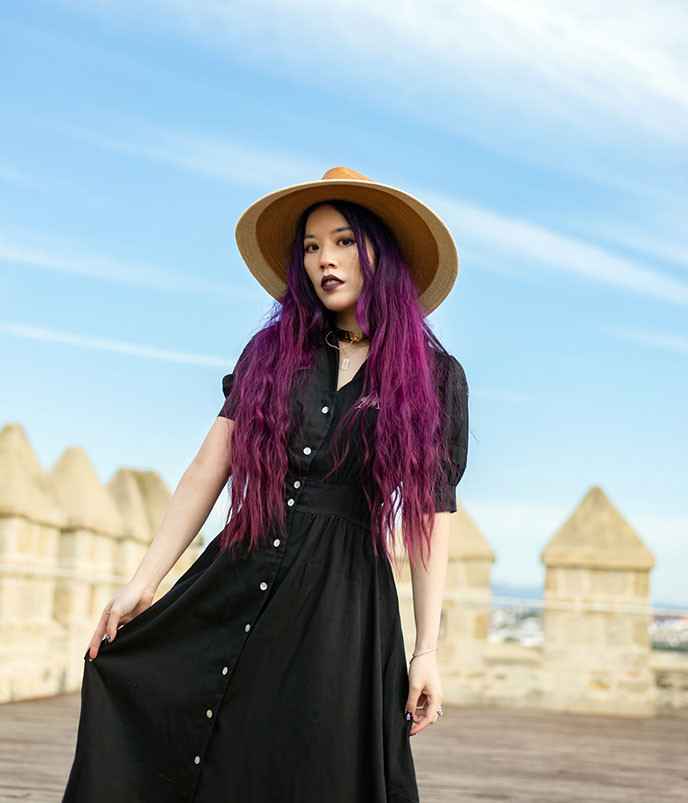
Hello, 2022! I’ve been taking some time offline (I’m currently busy with a major project, which I’ll announce soon). But I promised you more fashion and travel stories from Spain… so let’s go!
First up: an introduction to Kipkalinka Gothic jewelry, and my travel guide to Córdoba. In November 2021, I visited this historic city in Andalusia (south of Spain) and loved everything about it.
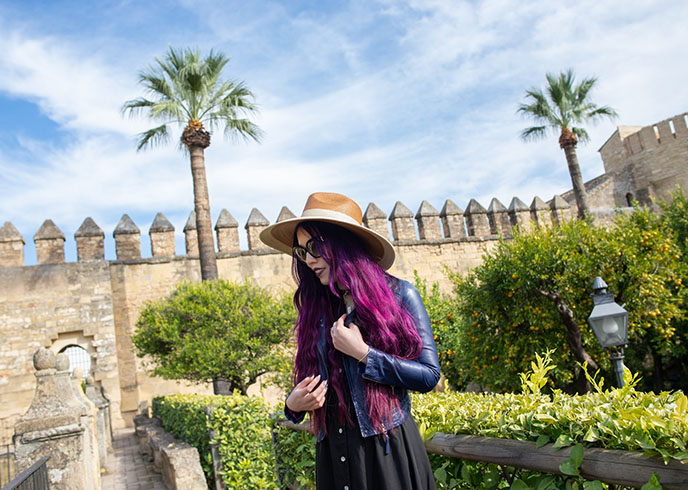
Cordoba is only a 45 minute train ride from Seville, making it the perfect day trip. The ancient city of learning is known for its Moorish aesthetics, stately royal gardens, and impressive structures (particularly the Roman bridge, and Mosque-Cathedral).

Elegant Cordoba was the perfect place to debut my skull and bones rings by Kipkalinka! I’ve long adored Christine Kipka’s work, and was thrilled to wear her creations dedicated to dark goddesses and mythical women of power. Her Goth jewelry is exquisitely handcrafted, and edgy yet subtle. As she puts it in her manifesto, “they can help you, a beautifully strange and unusual individual, to sense that you are not alone in your otherness.”

I paired her accessories with this “Wednesday” dress by The Apiologist, a London-based indie Goth fashion label. Fit for a ghost-lady, the design has antique touches such as gathered sleeves and buttons down the front, and an embroidered bee. It’s also made with 100% Lyocell, an eco pulp-made fabric.

Here’s a closeup of my Kipkalinka stack. From top to bottom: Wandika ring in white gold with aquamarine (with a skull on either side of the gorgeous gemstone). Kitsune in London blue topaz (inspired by a fox bone, and the Japanese spirit). Morena tri-skulls (love the expressions!). She works with nickel-free sterling silver, platinum, and gold alloys of at least 14K.

I’m on the rooftop of Torre De Calahorra, a tower built when Cordoba was under Islamic rule. It’s a stellar photography spot, and houses the Museo Vivo de Al-Andalus. (Photos by Joey Wong.)

My Satanic nail art (by Glam Nail Studio in Vancouver, BC) matches the fine blue gemstones of my Kipkalinka rings. Based in Leipzig, Christine Kipka runs her small business with her assistant Jana; both are natural born witches and professionally trained goldsmiths with 25 years of combined experience. Using age-old techniques and noble materials, Kipkalinka creates exceptional jewelry inspired by myth and lore.
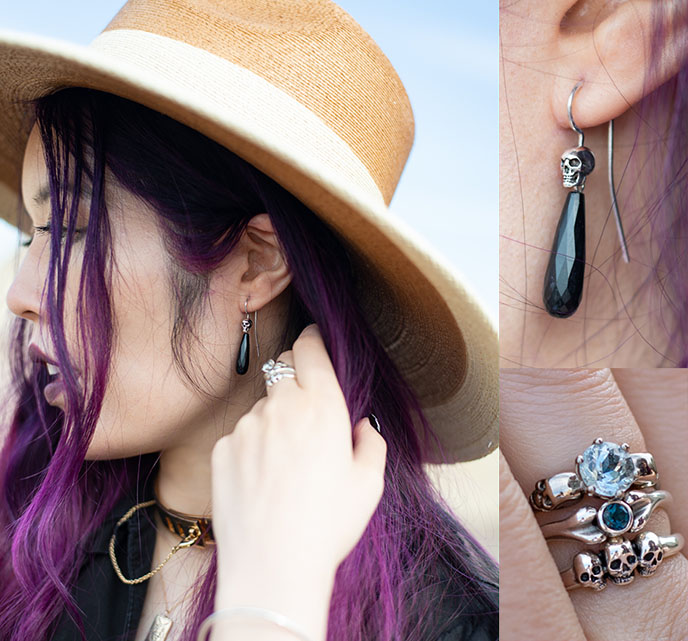
In addition to a variety of skull / Gothic rings, Kipkalinka offers handmade earrings, pendants, and necklaces with dark and witchy elements — such as these black onyx and skull dangle earrings.
On her website, she has a customizer that lets you create your dream wedding / engagement set. Christine can customize her rings in a variety of fine metals and gemstones. Since she works directly with every customer, you can be assured that the finished design will be a perfect fit for you.

Furthermore, Kipkalinka is conscious of the impacts of extracting metals from the Earth. She says, “To keep resources in the ground, all precious metal we use are sustainably recycled from old jewelry, and we collect all scrap to return it to a perpetual reuse-circuit.”

Her rings fit like a glove on me, and aren’t bulky or heavy (they won’t catch on your clothes). The detail and quality of her work are incomparable.
Please take a look at Kipkalinka’s site and Etsy to see more of her jewellery. (And keep reading for additional close-ups!)

Speaking of astonishing designs… anyone who visits Córdoba, Spain cannot miss out the Mosque–Cathedral, or Mezquita. Built around 784-786 ACE, the Great Mosque represents the pinnacle of Islamic Umayyad architecture with a minaret, intricate mosaics, and rows of arches.
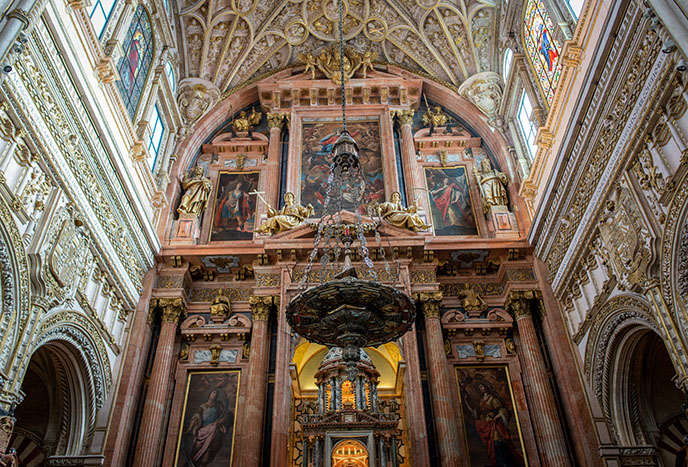
After the Christian takeover of Andalucía (the Reconquista), the new rulers built a cathedral inside the mosque while retaining most of the original structure. As a result, the Mezquita is a unique fusion of Islamic and Catholic architecture.

The place of worship has changed over the years. These dramatic Gothic choir stalls were crafted out of dark mahogany, in the mid-18th century.

Anyone who wishes to visit Mezquita-Catedral de Cordoba must get advance timed tickets through their website.
(Wearing a long Goth dress by The Apiologist, and of course a face mask as required indoors.)

Do look up, at the glorious Renaissance ceilings. The nave and transept are the work of Juan de Ochoa, completed in 1607.

The light from the windows illuminates the mihrab and multifoil arches (the scalloped design found in the Moorish architecture of al-Andalus).

Praying to the Prince of Darkness in my The Apiologist dress, and large gold Eddie Borgo Safety Chain choker necklace. I’m fond of black neoprene face masks, as they don’t smudge my makeup or tug on my ears.

The Mosque-Cathedral’s main altar features a large canvas of the Assumption.

Look closely, and you’ll see some devilish details in the surrounding carvings.

Here’s the episcopal throne that tops the choir, with a life-size representation of the Ascension.
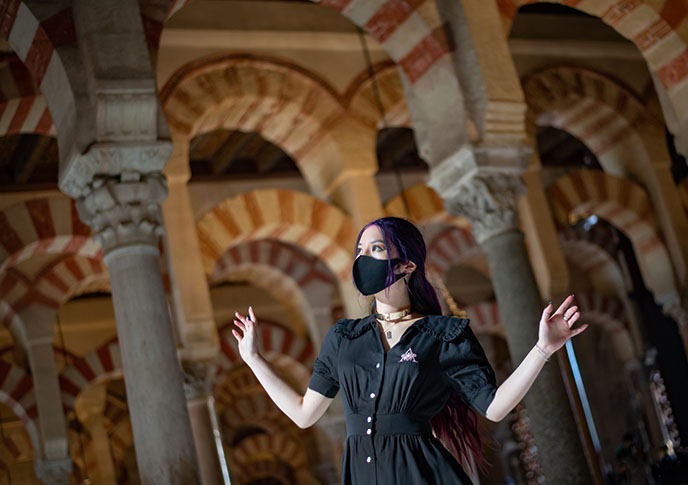
In contrast, the Islamic hypostyle prayer hall has 850 columns with red and white stripes on the arches.

The mix of styles is dazzling, especially with the play of light.

Be sure to plan ahead and reserve tickets, so that you can see the Mosque-Cathedral (aka Catholic Cathedral of Our Lady of the Assumption) in person.

Outside, there is a lovely Court of Oranges lined with the fruit trees. It frames the bell tower, which encases the mosque’s former minaret.

Walk around the historic district of Cordoba, and you’ll come across other eye-catching details — such as this memorial plaque to Cordoba poet Luis de Gongora, and Eastern style doors.

For a view of the city, go up to the terrace of Calahorra tower (Torre de la Calahorra). The Islamic fortress is located at one end of the Roman Bridge.

From this viewpoint, you can see Cordoba’s famous Roman Bridge, which was erected in the early 1st century BCE, and reconstructed over time (the arches have an Arabic feel). A statue of the angel Raphael (San Rafael) guards the passage over the water.
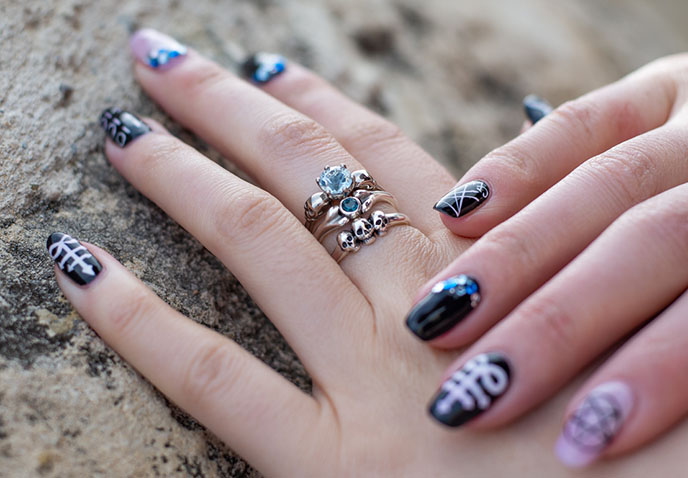
Cordoba’s centuries-old artisanship harmonizes with Kipkalinka’s approach. Jeweler and owner Christine takes up to 50 hours to perfect the prototype for each design. She executes them directly in metal, which allows her to create details (such as the skull faces) in microscopic scale. Then, everything is refined, polished, and filed to perfection.
Above: Wandika, Kitsune, and Morena rings in a stack.
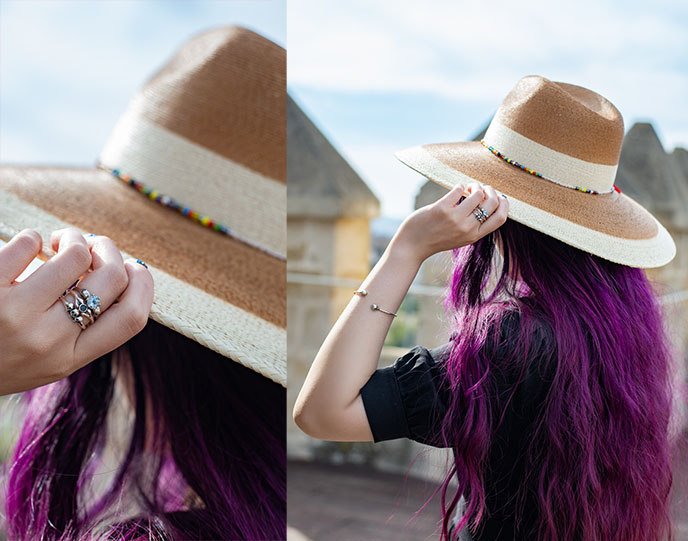
Her graceful, Gothic designs stand out — even at a distance.
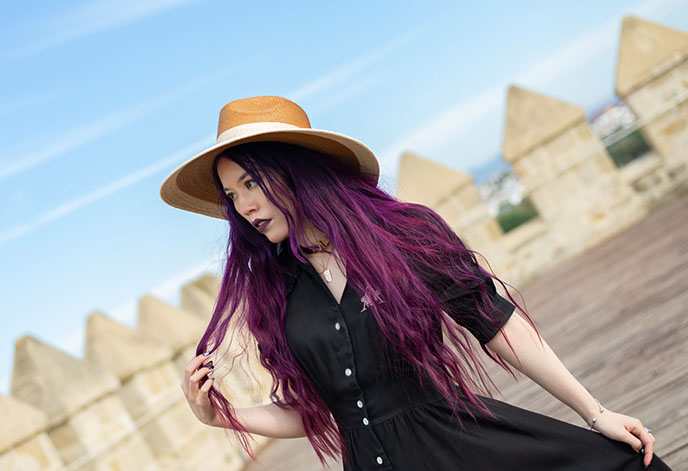
A Goth travel tip: visit Cordoba in the colder months, as this is the hottest area of Spain. If I were here in the summer, I wouldn’t be able to go around exploring.
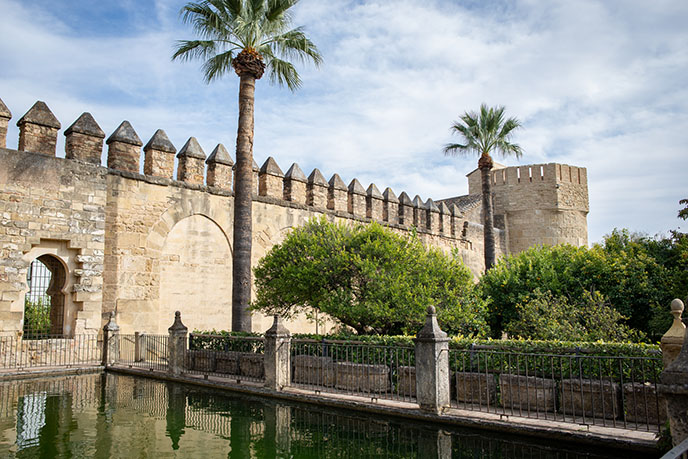
Onward to the Alcázar de los Reyes Cristianos (Castle of the Christian Monarchs), another top Cordoba attraction. The exterior looks like a military fortress, but the interior is a splendid garden that shows a mix of cultural influences.

The Alcazar was one of the primary residences of 15th century Spanish monarchs, Isabella I of Castile and Ferdinand II of Aragon. The grounds are resplendent with stone statues, fountains, and groves of bitter oranges (which are also seen throughout Sevilla).

Wouldn’t it be nice to be the Queen, and loiter in these magnificent gardens and courtyards all day…

The gardens include this stately Promenade of Kings, with tall hedges and fountains…

… as well as fruit trees, flower gardens, and ponds filled with koi fish.

Alcazar’s four towers include this rectangular one, which has gargoyles in the shape of lions up top.
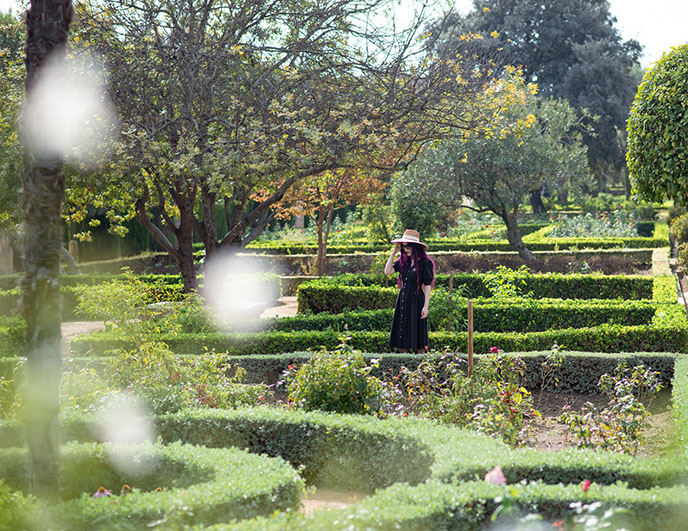
I could have spent hours in the Gardens of the Alcázar (Jardines del Alcázar) enjoying the sounds of the water, scents of the flowers, and changing light throughout the day.

The sunlight radiated off my Kipkalinka rings. Her jewelry is both classic and edgy, with a touch of the macabre — perfect for anyone with a Gothic disposition.

If you’re inspired and intrigued, check out more of Kipkalinka’s jewellery on her website and Etsy.

Cordoba is an extraordinary destination for anyone who loves art, history and culture. In these increasingly difficult, unpredictable and restrictive times (“The Collapse”), I’m forever thankful for opportunities to safely travel. (I was in Spain in Nov 2021 as part of a press trip, and mainly stayed outdoors / always masked indoors.)

PS: I leave you with a close-up of my Satanic nails by Glam Nail Studio in Vancouver, BC! (I hadn’t gotten any gel nails done professionally in two years.) My nail art has pentagrams, brimstone and Lucifer sigils, 666 in binary numbers, Baphomet… Hail to the team for nailing it.
SHARE & COMMENT

 LA CARMINA
LA CARMINA







2 Comments
This is 100% gorgeous! This is really great content. We love you support more your blog
Love your style, your fashions on point. Huge fan of your hairstyles.